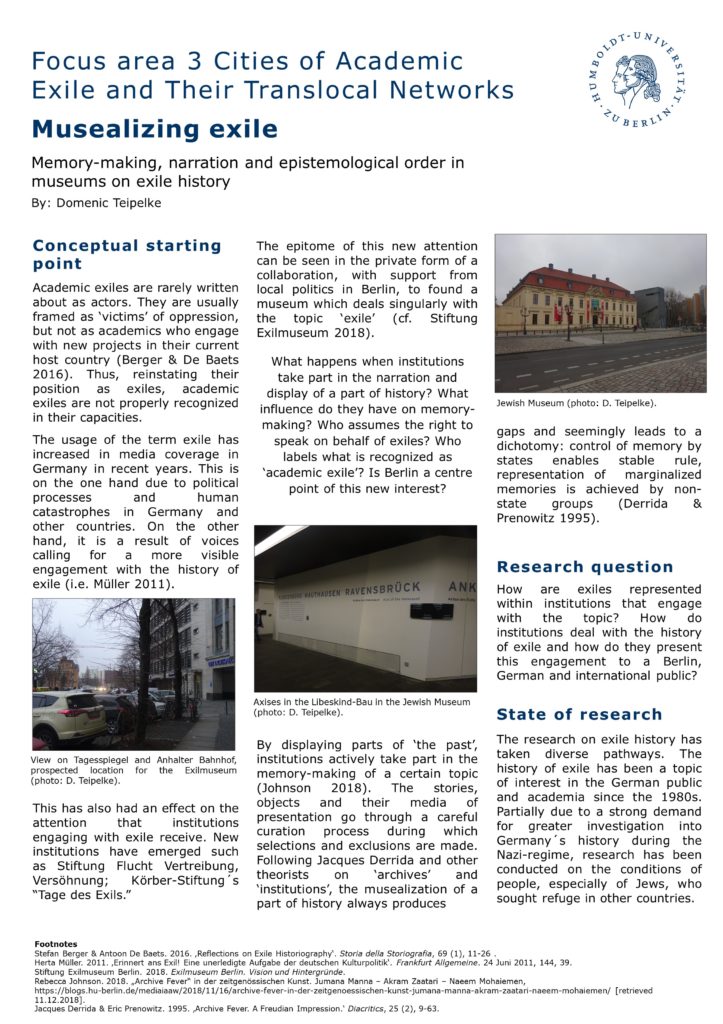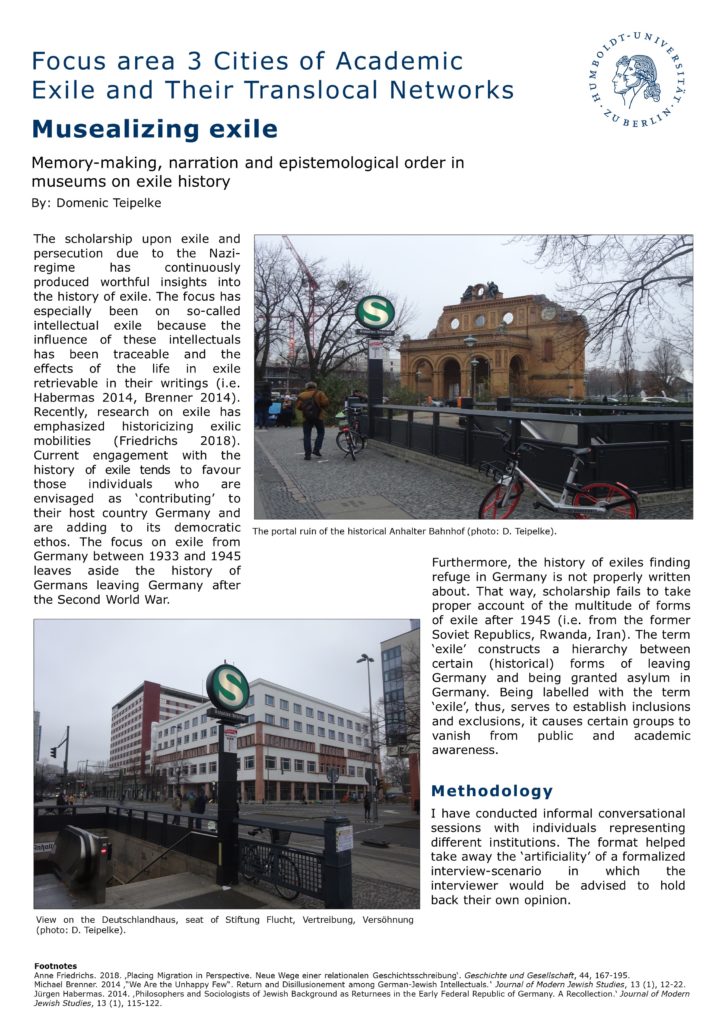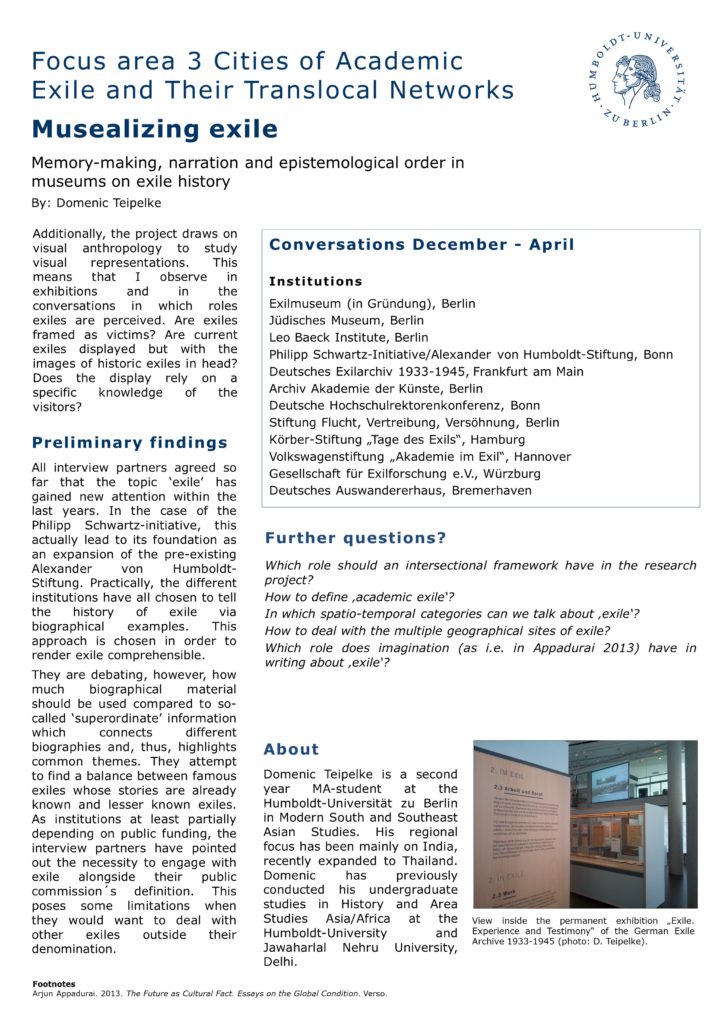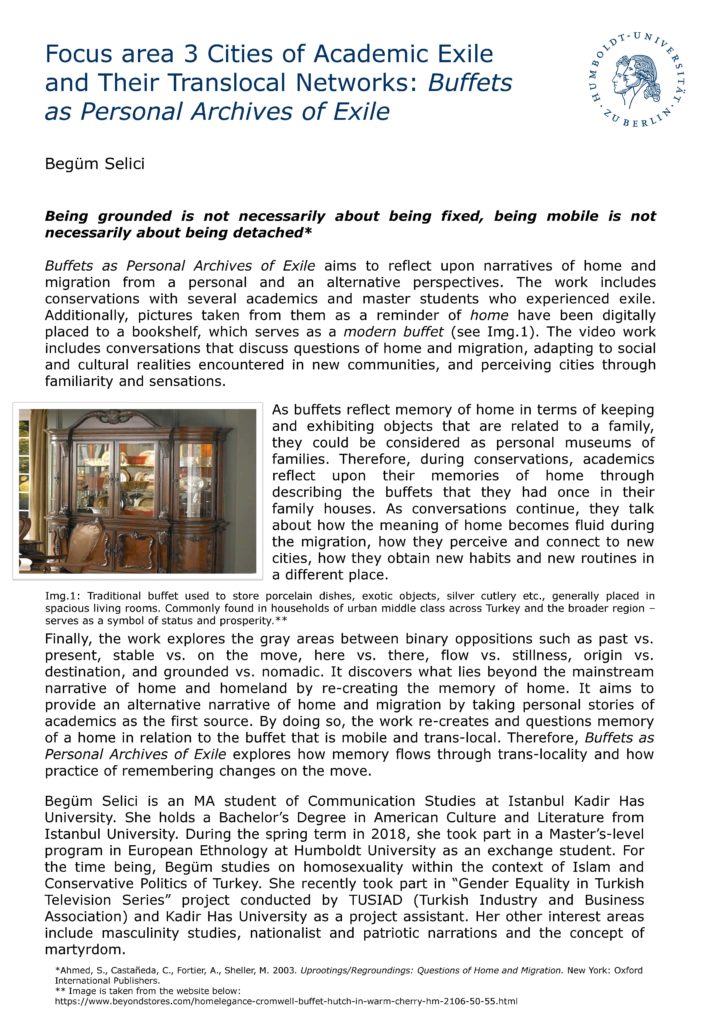This research-oriented interdisciplinary seminar sought to critically examine historical as well as current perceptions and discourses about academics who, due to institutional, structural or political constraints, were forced to leave their home country and seek exile elsewhere. In contrast to well-known artists or authors, exiled academics are often at the margin of inquiries into their specific situation and self-positioning. The seminar therefore aimed at a deeper understanding of their specific situation and self-representation. Students formed three research teams and carried out their own empirical research explorations into these topics. They were advised by teacher tandems and had the opportunity to specialize in one of three focus areas:
Focus area 1: Academics and identities on the move? The role of (social) media in processes of identity construction (Co-supervisors: Prof. Dr. Özen Odağ, Touro College Berlin, and Dr. Olga Hünler, Universität Bremen)
Focus area 2: (Transnational) Networks in Exile – Topics, Discourses and Advocacy (Co-supervisors: Prof. Dr. Carola Richter, Freie Universität Berlin, and Dr. Amal El-Obeidi, Universität Bayreuth)
Focus area 3: Cities of academic exile and their translocal networks (Co-supervisors: Prof. Dr. Nadja-Christina Schneider, Humboldt-Universität zu Berlin, and Prof. Dr. Nil Mutluer, Humboldt-Universität zu Berlin)
Focus Area 3
Musealizing Exile: Memory-making, Narration and Epistemological Order in Museums on Exile History
As a participant in the research seminar “Academics on the Move: Notions of Exile, Re-Migration and Translocal Solidarity” I decided to conduct research on musealization practices of exile and of exiles in Berlin. I want to understand how institutions conceptualize and engage with exile. The projects rests on especially two assumptions: museums and archives have an important influence on the extent of a society´s historic awareness because they have to select what they add to their archival holdings or what they decide to display. On the other hand, they might also be influenced by political issues and public debates, for example by receiving project-based funding or by demands for different stories to display. It is, however then, up to the institutions and individuals how aware they are of their responsibilities. Therefore, my aim is not to conduct research on historic exile. Instead, I aim at an understanding in second observation of representational practices. I ask how knowledge on exile is constructed in museums and which phenomena, historical and current, are labelled as exile. I am especially interested whether institutions share a common approach or even a common concept in order to present a history of exile that is more complete.
I decided to approach the topic by conducting conversations with representatives of different institutions which deal with current or historic forms of exile. The choice of institutions ranges from museums, i.e. the Jewish Museum Berlin, to foundations like the Stiftung Exilmuseum to scholarship foundations like the Alexander von Humboldt-Stiftung which awards the Philipp Schwartz-Scholarship to selected threatened foreign researchers. I chose to talk to institutions of various organizational structure and purpose because each of them engages with the topic and, therefore, has presumably a concept on how to define exile; and, more interesting even, who is not counted as exile. Furthermore, the discussion with the foundation helps me to understand what is perceived as a defining factor of academic exile. The methodology for the research is, thus, mainly based on conversations with exiles while also partially drawing from visual anthropology.
Some preliminary findings were presented at a multimedia exhibition in Touro College in December 2018. The poster at the exhibition focused mainly on two questions: Which space is devised to exiles and exilic history in museums in Berlin? Which gaps and silences are produced within exilic history?
My engagement with the topic since December lead to some new questions and establishment of contact with new institutions. Through the prolonged engagement I became more aware of existing cooperation and collaborations between institutions. My research focus has, however, slightly shifted after conducting several conversations. Instead of only criticizing a gap of awareness in exilic history (mainly, the time between 1950 to 2016), I look at current representations in exhibitions. This means that I observe in exhibitions and in the conversations in which roles exiles are perceived. Are exiles framed as victims? Are current exiles displayed but with the images of historic exiles in head? Does the display rely on a specific knowledge of the visitors? How do museums choose exemplary persons through whose biography they attempt to tell a history of exile? The research project has continuously been gripping for me. It is an interesting experience to learn more about the institutional frameworks and self-critical reflections on current museal practices.



Cities of Academic Exile and Their Translocal Networks



